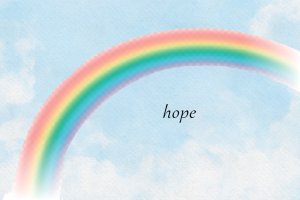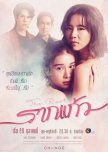Powerful lakorn about trauma and abuse
As of this writing, the tags are misleading and inappropriate. I'm compiling evidence (which means going back through every episode trying to find dialogue to screenshot) to get them changed.
My changes to the tags were accepted early June '25. Please realise that reviews and comments made before then were primarily from viewers who expected it to be a lesbian romance/GL because that is how it was tagged.
-----
Rakkaew is a powerful psychological - almost Shakespearean - lakorn about trauma and abuse, sexism, controlling parents, control and abuse in other family/non-family relationships, and how the wealthy are able to use money, power and position to skirt the law.
It is dense and complicated, messy in content but well-structured in form, with callbacks, symbolism and use of parallels between characters. There's a lot going on but it's always clear, at least if you pay attention, especially to things like who is making incorrect assumptions and why Sai says some of the things she does.
And those stunning monologues delivered by Cris which wouldn't be out of place on a theatre stage. They explain a lot, like why Rangrong couldn't have been written as a male character. Amongst other things, societal and parental sexism are very much part of why she is as she is.
There is something of a romance tucked within but it isn't a focus. There are a lot of supportive friends, and a found family accumulating around Sai. The tags I'm asking to be added are mostly heavy but, like the majority of Thai works, it adds plenty of warmth, light and compassion to the shadows.
Three older characters say homophobic things. Three younger characters are very clear in explicitly saying the opposite. This is in keeping with the call for social change in things like approaches to parenting.
I don't know how the 1971 novel treated Rangrong, her mental illness, hatred of (abusive) men/assumption that men will be abusive, or her orientation. The title, Rakkaew (Taproot), has repeated thematic significance regarding parental love (or lack) and the consequences of how children are raised, which suggests those aspects were vital to the novel as well. In the hands of this director, writer and actors, the story is very much an exploration of deep trauma. They are careful to repeatedly and explicitly root Rangrong's actions, feelings and psychological state in the sexist abuse she endured.
And because sexism features so intensely in Rangrong's story, her character could not have been written as a man, even if it that would have made Sai's story more palatable to many here.
If you're looking for GL, this isn't it. If you're looking to watch as a form of fictional gossip, there's plenty to react to. If you're willing to give this your attention, it is compelling and absorbing - like a Shakespearean play with 18 hours to explore and reveal itself.
And it is very much worth that time and attention. Rakkaew is amongst the best I've seen.
My changes to the tags were accepted early June '25. Please realise that reviews and comments made before then were primarily from viewers who expected it to be a lesbian romance/GL because that is how it was tagged.
-----
Rakkaew is a powerful psychological - almost Shakespearean - lakorn about trauma and abuse, sexism, controlling parents, control and abuse in other family/non-family relationships, and how the wealthy are able to use money, power and position to skirt the law.
It is dense and complicated, messy in content but well-structured in form, with callbacks, symbolism and use of parallels between characters. There's a lot going on but it's always clear, at least if you pay attention, especially to things like who is making incorrect assumptions and why Sai says some of the things she does.
And those stunning monologues delivered by Cris which wouldn't be out of place on a theatre stage. They explain a lot, like why Rangrong couldn't have been written as a male character. Amongst other things, societal and parental sexism are very much part of why she is as she is.
There is something of a romance tucked within but it isn't a focus. There are a lot of supportive friends, and a found family accumulating around Sai. The tags I'm asking to be added are mostly heavy but, like the majority of Thai works, it adds plenty of warmth, light and compassion to the shadows.
Three older characters say homophobic things. Three younger characters are very clear in explicitly saying the opposite. This is in keeping with the call for social change in things like approaches to parenting.
I don't know how the 1971 novel treated Rangrong, her mental illness, hatred of (abusive) men/assumption that men will be abusive, or her orientation. The title, Rakkaew (Taproot), has repeated thematic significance regarding parental love (or lack) and the consequences of how children are raised, which suggests those aspects were vital to the novel as well. In the hands of this director, writer and actors, the story is very much an exploration of deep trauma. They are careful to repeatedly and explicitly root Rangrong's actions, feelings and psychological state in the sexist abuse she endured.
And because sexism features so intensely in Rangrong's story, her character could not have been written as a man, even if it that would have made Sai's story more palatable to many here.
If you're looking for GL, this isn't it. If you're looking to watch as a form of fictional gossip, there's plenty to react to. If you're willing to give this your attention, it is compelling and absorbing - like a Shakespearean play with 18 hours to explore and reveal itself.
And it is very much worth that time and attention. Rakkaew is amongst the best I've seen.
Was this review helpful to you?


 1
1 4
4 1
1 1
1 1
1





















